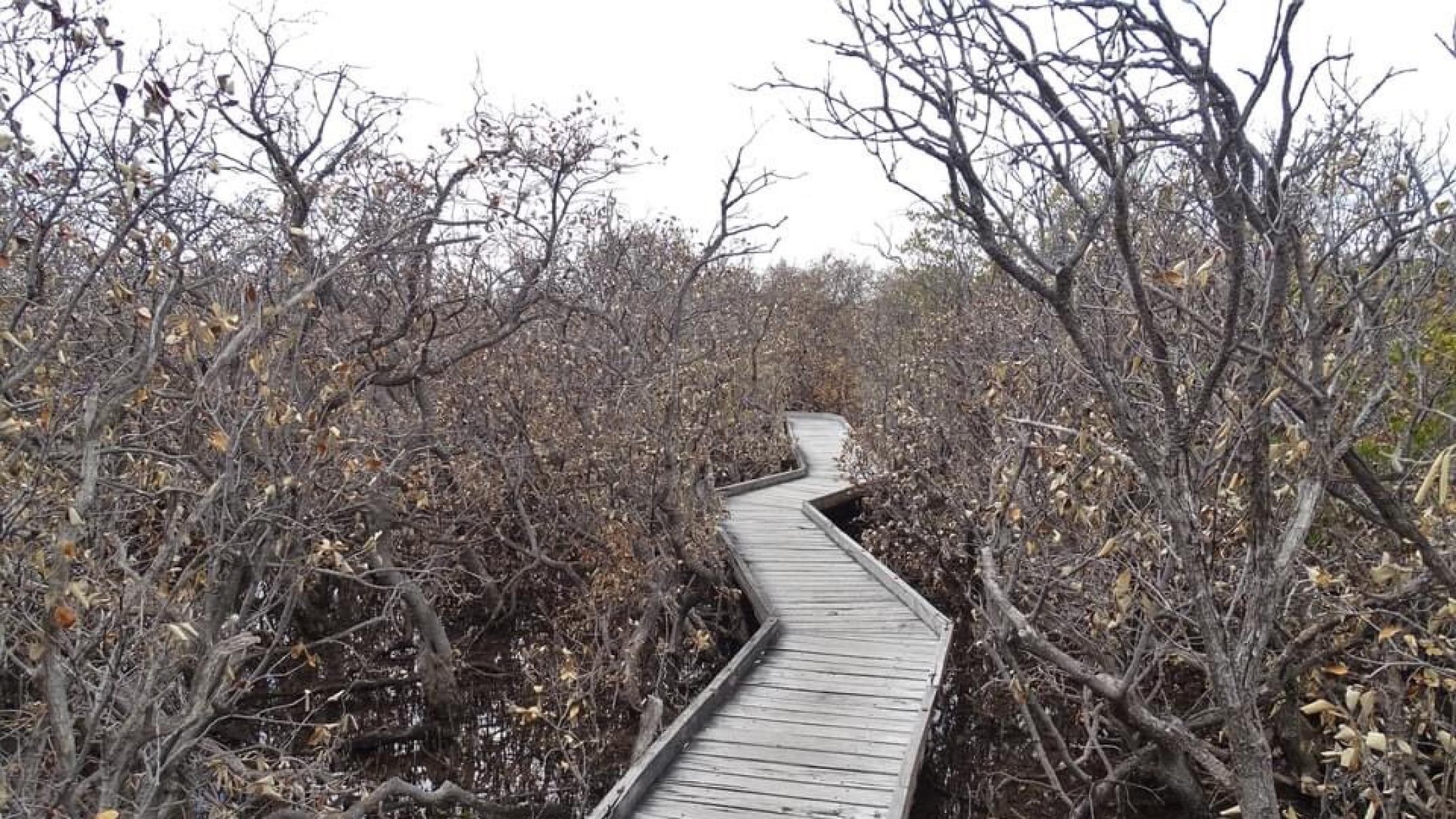Environmentalists are calling for urgent action to prevent further dieback of a popular mangrove forest north of Adelaide, saying extremely salty water is killing the sensitive plants.
Key points:
- Mangroves at St Kilda have died and more are under threat
- It is believed leaking salt ponds, mined by Buckland Dry Creek, are contributing to the salinity
- The SA Government says it is “working frantically” to fix the issue
About 10 hectares of mangrove forest adjacent to the St Kilda Mangrove Trail died within two months last year, along with 35 hectares of salt marsh, and the gardens of about half a dozen houses.
Nearby brine ponds, mined for salt by company Buckland Dry Creek, are believed to be leaking hypersaline water into the mangrove ecosystem — threatening not only their existence, but that of several fish and migratory bird species.
Environmental consultant Peri Coleman is calling for excess brine in the ponds to be pumped out immediately before it solidified and could not be moved.
“The brine in the ponds is now well over 10 times saltier than seawater.
“South of St Kilda, the brine is already crystalising, and you can’t move crystalising brine through pipes and ponds.”
Ms Coleman said she believed the dieback was caused by the refilling of gypsum ponds with hypersaline brine at the nearby Dry Creek salt field, about 20 kilometres north of Adelaide’s CBD.
She said the ponds had been empty since 2014, causing their gypsum lining to dry out and crack.
“Once the brine was filled back up into those ponds, it immediately started to seep out and took the acid and the hypersaline brine with it into the mangroves and salt marsh area,” she said.
Company slow in following order
In September 2020, 10 hectares of the mangrove forest and 35 hectares of saltbush adjacent to the St Kilda Mangrove Trail died, prompting an investigation by several Government departments.
On Christmas Eve, the State Government issued the company a direction to remove as much brine from the ponds as reasonably practical.
Conservation Council SA chief executive Craig Wilkins said that had not yet happened.
“What we’re really calling for … is for the company and the Government to step up their pace and make sure they stop playing catch up, because this snowball which is already a problem before Christmas is now turning into an avalanche.”
When contacted, Buckland Dry Creek director Petar Jurkovic declined to comment.
Removing brine ‘incredibly tricky’
Environment Minister David Speirs described the issues facing the mangrove forest as “the most complicated environmental matter I’ve ever come across since being Environment Minister”.
“We are talking about 35km of saltpans that work together; the pumps need to be in the right place, and that’s an engineering feat in itself.”
Mr Speirs said Buckland Dry Creek had been “quite cooperative” with the Government’s direction, and both parties were working together to fix the issue as quickly as possible.
“But because of this interconnected system, if you change one area to try to fix things there, you might actually trigger environmental detriment elsewhere,” he said.
“This is incredibly tricky.”
Opposition environment spokeswoman Susan Close said the series of events that had put the St Kilda mangroves under threat was due to the actions of the Government.
“What we understand about the pumping plan is that it was allowed by the Government, and that it’s had a terrible impact on the mangroves,” she said.
Mr Speirs said he believed Buckland Dry Creek’s decision to reinstate the dried-up salt pans had been properly reviewed by his department.
“I believe the sufficient environmental checks and balances were taken into account,” he said.
“Previous activity has been reinstated — in the past it hasn’t caused issues, but this time, for whatever reason, it has resulted in hypersaline water affecting the mangroves.”
Dr Close said the community deserved to know whether the mangroves could be saved, and what action the Government was taking to that end.
“I am trying to do everything I can; I’m working with the company, the mining department, the scientists, to get this fixed,” Mr Speirs said.
“Is it easy? No. Will more mangroves die off in the coming weeks? I think so… but I’m hoping not much more.”




